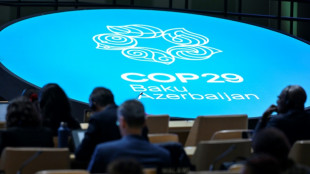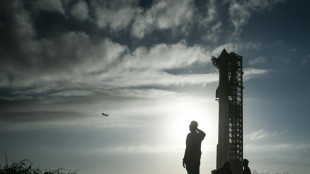
-
 UNAIDS chief says husband, Ugandan opposition figure Besigye, 'kidnapped'
UNAIDS chief says husband, Ugandan opposition figure Besigye, 'kidnapped'
-
Nadal's sensational career ends as Netherlands defeat Spain in Davis Cup

-
 US announces talks with Israel over civilian casualties in Gaza
US announces talks with Israel over civilian casualties in Gaza
-
SpaceX fails to repeat Starship booster catch, as Trump looks on

-
 G20 summit ends with Ukraine blame game
G20 summit ends with Ukraine blame game
-
Trump appoints TV celebrity 'Dr. Oz' to key US health post

-
 European stocks fall on Ukraine-Russia fears, US focused on earnings
European stocks fall on Ukraine-Russia fears, US focused on earnings
-
Last-gasp Szoboszlai penalty rescues Hungary draw with Germany

-
 Germany, Netherlands draw as Nations League group stage ends
Germany, Netherlands draw as Nations League group stage ends
-
Hong Kong tycoon Jimmy Lai takes witness stand in collusion trial

-
 Guardiola set to extend stay as Man City boss - reports
Guardiola set to extend stay as Man City boss - reports
-
Minnows Botswana hold Egypt to qualify with Mozambique, Tanzania

-
 Inter Miami coach Martino leaving club for 'personal reasons' - club source
Inter Miami coach Martino leaving club for 'personal reasons' - club source
-
Chinese man sentenced to 20 months for Falun Gong harassment in US

-
 Hong Kong court jails 45 democracy campaigners, drawing condemnation
Hong Kong court jails 45 democracy campaigners, drawing condemnation
-
'I did it for Rafa': Alcaraz after keeping Spain Davis Cup dream alive

-
 Alcaraz keeps Spain and Nadal Davis Cup dream alive
Alcaraz keeps Spain and Nadal Davis Cup dream alive
-
Trump names China hawk Howard Lutnick commerce secretary

-
 Europe's pivotal role in bid to strike COP29 climate deal
Europe's pivotal role in bid to strike COP29 climate deal
-
MotoGP champion Martin falls on Aprilia debut

-
 Bodies burned after Haiti police, civilians kill 28 alleged gang members
Bodies burned after Haiti police, civilians kill 28 alleged gang members
-
'Probably my last match': Nadal after Davis Cup singles defeat

-
 Iran faces new censure over lack of cooperation at UN nuclear meeting
Iran faces new censure over lack of cooperation at UN nuclear meeting
-
Afghan woman teacher, jailed Tajik lawyer share top rights prize

-
 Pressure mounts on Scholz over bid for second term
Pressure mounts on Scholz over bid for second term
-
Take two: Biden makes it into G20 leaders' photo

-
 Russia vows response after Ukraine fires long-range US missiles
Russia vows response after Ukraine fires long-range US missiles
-
Spain's Nadal loses in Davis Cup quarter-finals singles opener

-
 Four elite Brazil officers arrested over alleged 2022 Lula murder plot
Four elite Brazil officers arrested over alleged 2022 Lula murder plot
-
SpaceX set for Starship's next flight -- with Trump watching

-
 Trump ally seeks to block trans lawmaker from women's restrooms
Trump ally seeks to block trans lawmaker from women's restrooms
-
Slovakia oust Britain to meet Italy in BJK Cup title match

-
 Top-selling daily French daily Ouest-France stops posting on X
Top-selling daily French daily Ouest-France stops posting on X
-
Russian invasion toll on environment $71 billion, Ukraine says

-
 'Sabotage' suspected after two Baltic Sea cables cut
'Sabotage' suspected after two Baltic Sea cables cut
-
'You will die in lies!': daughter clashes with father at French rape trial

-
 Spain Women drop veterans Paredes and World Cup kiss victim Hermoso
Spain Women drop veterans Paredes and World Cup kiss victim Hermoso
-
Stocks diverge on fears of Ukraine-Russia escalation

-
 New Botswana leader eyes cannabis, sunshine to lift economy
New Botswana leader eyes cannabis, sunshine to lift economy
-
'Operation Night Watch': Rembrandt classic gets makeover

-
 Haiti police, civilians kill 28 gang members: authorities
Haiti police, civilians kill 28 gang members: authorities
-
Taxing the richest: what the G20 decided

-
 'Minecraft' to come to life in UK and US under theme park deal
'Minecraft' to come to life in UK and US under theme park deal
-
IMF, Ukraine, reach agreement on $1.1 bn loan disbursement

-
 Japan on cusp of World Cup as Son scores in Palestine draw
Japan on cusp of World Cup as Son scores in Palestine draw
-
Chelsea condemn 'hateful' homophobic abuse towards Kerr, Mewis

-
 Hamilton to race final three grands prix of Mercedes career
Hamilton to race final three grands prix of Mercedes career
-
Gatland has not become a 'bad coach' says Springboks' Erasmus

-
 Slovakia take Britain to doubles decider in BJK Cup semis
Slovakia take Britain to doubles decider in BJK Cup semis
-
Brazil arrests soldiers over alleged 2022 Lula assassination plot


War crime, crime against humanity, genocide: What's the difference?
Russia is accused of war crimes in Ukraine, with the claims growing louder following the discovery of dozens of bodies in areas recently retaken from Russian forces near the capital Kyiv.
Ukrainian President Volodymyr Zelensky has accused Moscow of attempted "genocide" over the findings and labelled the bloody siege of the southern port of Mariupol a "crime against humanity".
We take a look at the different categories of the most serious crimes known to man, which the International Criminal Court (ICC) in The Hague was set up to prosecute.
Neither Russia nor Ukraine are parties to the ICC but Ukraine has accepted the court's jurisdiction for alleged crimes committed on its soil since Russia's invasion of Crimea.
The ICC's chief prosecutor opened a probe into possible war crimes in Ukraine on March 3.
- What is a war crime? -
War crimes are serious violations of international law against civilians and combatants during an armed conflict.
The parameters of what constitutes such a crime are set out in Article 8 of the 1998 Rome Statute that established the ICC.
It defines them as "grave breaches" of the 1949 Geneva Conventions covering more than 50 scenarios, including killing, torture, rape and the taking of hostages as well as attacks on humanitarian missions.
It also covers deliberate attacks on civilians or "towns, villages, dwellings or buildings which are undefended and which are not military objectives" as well as the "deportation or transfer of all or parts of the population" of an occupied territory.
- What is a crime against humanity? -
The notion of such a crime was first laid down on August 8, 1945, and codified in article 7 of the Rome Statute. It involves "a widespread or systematic attack directed against any civilian population" including "murder" and "extermination" as well as "enslavement" and "deportation or forcible transfer."
Crimes against humanity can occur in peacetime and include torture and rape and discrimination, be it racial, ethnic, cultural, religious or gender-based.
- What is genocide? -
Genocide as a legal concept dates back to the Nuremburg trials of Nazi war criminals, with Polish-Jewish lawyer Raphael Lemkin coining the term to describe the Nazi extermination of six million Jews.
The crime of genocide was formally created in the Genocide Convention of 1948 to describe "acts committed with intent to destroy, in whole or in part, a national, ethnical, racial or religious group".
Genocide is a "very specific international crime" which is difficult to prove, says Cecily Rose, professor of international law at the University of Leiden in the Netherlands, noting that it demands proof of the "mental motivation" behind it.
- Newcomer: crime of aggression -
The ICC added a crime of aggression to its remit in 2017 to includes attacks on "the sovereignty, territorial integrity or political independence" of another country.
The offence aims to ensure that political and military leaders be held accountable for invasions and other major attacks but cannot be used against the dozens of ICC members that have not recognised the court's jurisdiction for the crime.
The ICC also cannot indict the leader of a country that is not a member of the ICC for the crime of aggression.
Legal experts say that bringing such a case against Russia may require the establishment of a special tribunal.
Ch.P.Lewis--AT
